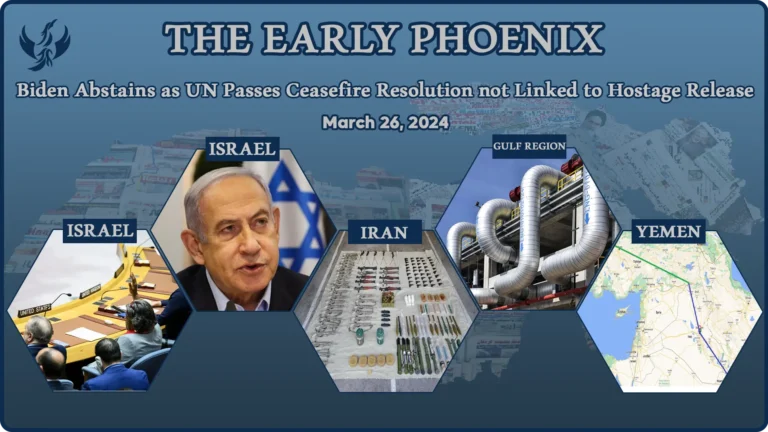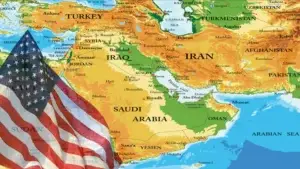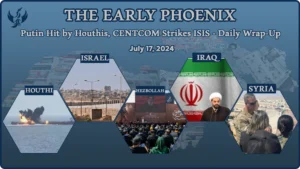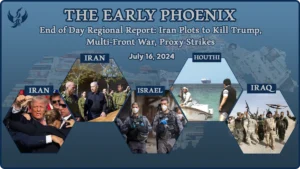Biden Abstains as UN Passes Ceasefire Resolution not Linked to Hostage Release
TOP HEADLINES:
- U.S. Abstains as U.N. Passes Ceasefire Resolution not Contingent on Hostage Release
- Netanyahu Cancels Israeli Delegation to DC
- Israel Disrupts Major Iranian Weapons Smuggling to the West Bank
- Houthi Blockade of Red Sea Rekindles Interest in Iraq-Turkey Alternative Trade Route
- China Proposes to Connect its Belt and Road Initiative with Saudi Vision 2030
=======================
★ ISRAEL & PALESTINIAN TERRITORIES
-
U.S. Abstains as U.N. Passes Ceasefire Resolution not Contingent on Hostage Release
The U.N. Security Council unanimously passed a resolution calling for a Ramadan ceasefire and the release of all hostages in the Gaza conflict, with the U.S. abstaining from the vote. Israeli Prime Minister Benjamin Netanyahu canceled a planned delegation to Washington in response, asserting Israel will not cease military operations. The resolution, altered from demanding a “permanent” to a “lasting” ceasefire, emphasizes the need for humanitarian aid flow and compliance with international law. The U.S. stated the vote does not signal a policy shift, maintaining the stance that a ceasefire should accompany the release of hostages—although the resolution text does not make the ceasefire contingent on Hamas’s release of Israeli hostages.
-
Netanyahu Cancels Israeli Delegation to Washington Following U.N. Ceasefire Resolution
Israeli Prime Minister Benjamin Netanyahu called off a planned visit to Washington by an Israeli delegation after the United States did not veto a U.N. Security Council resolution demanding a Ramadan ceasefire in Gaza. The resolution, which passed with the U.S. abstaining, marked a departure from previous U.S. positions linking ceasefire to hostage release. Netanyahu’s office criticized the U.S. for altering its stance, which they believe compromises efforts to free Israeli hostages held by Hamas. The cancellation reflects escalating tensions and dissatisfaction with the international response to the ongoing conflict in Gaza.
-
Blinken Discusses Alternatives to Ground Invasion of Rafah with Israeli Defense Minister
U.S. Secretary of State Antony Blinken, in a meeting with Israeli Defense Minister Yoav Gallant, emphasized alternatives to a ground invasion of Rafah, which the White House argues would better secure Israel’s safety and protect Palestinian civilians. Blinken reiterated the U.S.’s support for defeating Hamas, including in Rafah, but opposed a broad ground operation, highlighting solutions that could ensure Israel’s security while safeguarding civilians. The discussions took place at the U.S. State Department, shortly after Israel canceled a high-level delegation’s visit to Washington, following the U.S. abstention in a UN Security Council vote calling for an immediate ceasefire.
-
In Blow to Netanyahu, Gideon Saar Announces Resignation from Israeli Government
Gideon Saar, leader of the “New Hope” party, announced his resignation from the government, citing a lack of influence on policy direction amidst the ongoing conflict. In a press conference, Saar stated his responsibility for decisions made since joining the government but emphasized the inability to effect change. He criticized the prolongation of military action, claiming it counteracts national interest, and highlighted the inefficacy in addressing the humanitarian crisis and military objectives. Saar also criticized the exclusion of the broader Cabinet from critical information, advocating for a more inclusive and critical discussion within the government’s decision-making process.
-
Hamas Accuses Israel of Thwarting Ceasefire Efforts in Gaza
Hamas accused Israel of undermining efforts to achieve a temporary ceasefire in the ongoing conflict in Gaza, including the release of Israeli hostages and Palestinian prisoners. Hamas, emphasizing its commitment to its initial demands presented on March 14, insists on a comprehensive ceasefire, withdrawal from Gaza, return of displaced persons, and a genuine prisoner exchange. The movement holds Israeli Prime Minister Benjamin Netanyahu and his government fully responsible for blocking the negotiation efforts. This stance follows the UN Security Council’s call for an immediate ceasefire, which the U.S. abstained from vetoing, marking a significant moment in the council’s response to the crisis.
-
Hamas Leader Ismail Haniyeh Plans Tehran Visit
Ismail Haniyeh, leader of Hamas, is set to visit Tehran to engage with top Iranian officials. Hosting senior members of Hamas, Qatar is currently Haniyeh’s residence. This trip follows a November meeting with Iran’s Supreme Leader Ali Khamenei, where Khamenei condemned actions by the “Zionist regime” and affirmed Iran’s support for Palestinian resistance. This visit underscores the enduring ties between Iran and Hamas, especially significant considering Iran’s role in training up to 500 Hamas and Palestinian Islamic Jihad members prior to recent conflicts, and Hezbollah’s support for Hamas with attacks from Lebanon.
=======================
★ IRAN
-
Israel Foils Iranian Weapon Smuggling Attempt
The Israel Security Agency disclosed the interception of an Iranian-led attempt to smuggle advanced weaponry into the West Bank, aimed at attacking Israeli targets. This operation, attributed to Iran’s Quds Force and the IRGC’s Unit 4000, involved coordination with the IDF and led to the seizure of a significant cache of weapons. Interrogations of Palestinian detainees linked to terror plans unveiled the involvement of Munir Makdah, a known Fatah official and IRGC and Hezbollah affiliate, in recruiting operatives and funding terror activities. The seized arsenal included anti-tank missiles, grenade launchers, explosives, and assault rifles.
-
Israel Disrupts Major Iranian Weapons Smuggling to the West Bank
In a significant security operation, Israel claimed to have halted a large-scale effort by Iran to smuggle advanced weapons into the West Bank, aiming to fuel terrorist activities against Israeli targets. The collaborative effort between the Israeli Defense Forces (IDF) and the Israel Security Agency (ISA) spotlighted Munir Makdah, a known figure linked to Hezbollah and the Iranian Revolutionary Guard, as a central figure in the weapons smuggling operation. Investigations into recent attempts at terrorist attacks against Israel led to the unraveling of this plot, underscoring Iran’s alleged involvement in seeking to destabilize the region through the arming of Palestinian operatives.
-
Abdollahian and Borell push for talks to lift nuclear sanctions
The EU foreign policy chief, Josep Borell, and Iran’s foreign minister Amir Abdollahian are actively seeking to resume talks on lifting nuclear sanctions, with both sides emphasizing the importance of sustainable dialogue. Amid efforts to revive the 2015 Joint Comprehensive Plan of Action (JCPOA), Iran’s Foreign Minister, Amir Abdollahian, calls for adherence to agreements and criticizes the West’s inconsistent stance on global conflicts, highlighting the disparity in responses to the crises in Gaza and Ukraine.
=======================
★ LEBANON
-
Mikati Calls for Pressure on Israel to Cease Attacks on Lebanon Following UN Security Council Resolution
Lebanese caretaker Prime Minister Najib Mikati urges nations to pressure Israel to halt its assaults on Lebanon in light of the UN Security Council’s resolution for an immediate ceasefire in Gaza. Mikati welcomes the resolution as a crucial step towards ending Israeli aggression and emphasizes the importance of Israel adhering to it for providing relief to Palestinians. He advocates for a political process to resolve the ongoing conflict, granting Palestinians their rights based on international resolutions and the two-state solution.
-
Lebanon Submits Complaint to UN About Israeli Overflights of Lebanon
Lebanon submitted a complaint to the UN Security Council against Israel, attributing “international responsibility” to Tel Aviv for any incidents resulting from actions contrary to international aviation regulations, following ongoing interference affecting Beirut-Rafic Hariri International Airport’s navigation systems. The Lebanese Foreign Ministry’s complaint, backed by technical data, aims to document these violations and calls for UN Security Council action if Israeli practices threaten international peace and security.
=======================
★ YEMEN
-
Houthi Leader Urges Saudi-Led Coalition to Embrace Peace Plan
Mahdi al-Mashat, head of the Houthi Supreme Political Council, has called on the Saudi-led coalition to advance towards sustainable peace by signing and implementing the peace roadmap agreed upon with Riyadh. On the eve of the tenth anniversary of the “Operation Decisive Storm” military campaign, al-Mashat reaffirmed the Houthi commitment to peace, assuring that Yemen poses no threat to any nation. He emphasized celebrating the day not as a mark of war but as a symbol of defense and the resilience of the Yemeni people.
=======================
★ IRAQ
-
Houthi Blockade of Red Sea Rekindles Interest in Iraq-Turkey Alternative Trade Route
Heightened maritime tensions blocking the Red Sea and Bab el-Mandeb Strait, affecting 15% of global trade, have rekindled interest in the Iraq-Turkey “Development Road” project as an alternative to the Red Sea trade route. Proposed by Iraqi Prime Minister Mohammed Shia’ Al-Sudani during his visit to Ankara, this initiative aims to enhance East-West trade connectivity. Disruptions in maritime navigation have escalated shipping costs, making the Development Road a compelling alternative for future secure trade routes. The upcoming visit of Turkish President Recep Tayyip Erdogan to Iraq is expected to further cement this project, poised to reshape regional trade dynamics.
-
Ammar Al-Hakim Advocates for Saudi Role in Iraq’s Urban Development
Ammar Al-Hakim, leader of the National Wisdom Movement, emphasizes the significance of Iraq’s political and economic openness towards its Arab and Islamic environment, advocating for a Saudi contribution to Iraq’s urban development. During his visit to Saudi Arabia, Al-Hakim met with Crown Prince Mohammed bin Salman, discussing the enhancement of bilateral relations and the positive impact of Iraq’s stability on regional security. Al-Hakim also highlighted the importance of dialogue in resolving regional disputes and expressed a desire for Iraq to transition towards mutual interests and sovereignty-respecting relations with its neighbors.
-
Iraqi Court Acquits Police Officer Previously Convicted in Hisham Al-Hashimi’s Murder
An Iraqi court has acquitted a police officer previously sentenced to death for leading a group that assassinated Hisham Al-Hashimi, a government advisor on defeating ISIS and limiting pro-Iranian factions’ influence. Despite earlier confessions, the Baghdad court cited insufficient evidence for conviction. Al-Hashimi was killed outside his home in July 2020, with his death linked to his work against pro-Iranian groups, although no group has claimed responsibility.
-
Has Iran Given Türkiye a Green Light for an Offensive Against the PKK?
An ambitious deal involving Baghdad, Ankara, and Tehran aims to dismantle the Kurdistan Workers’ Party (PKK) in Iraq, revealing a complex regional shuffle post-Gaza war. With the Popular Mobilization Forces (PMF) playing a pivotal role, this agreement transcends military collaboration against the PKK, hinting at broader Middle Eastern realignments. Turkey’s comprehensive strategy, supported tacitly by Iran, anticipates major shifts in regional dynamics, positioning Ankara for a significant political and military influence in Iraq. However, internal balances and the entrenched presence of the PKK in Sinjar pose substantial challenges to the deal’s success.
=======================
★ GULF REGION
-
China Proposed to Connect its Belt and Road Initiative with Saudi Vision 2030
The National Development and Reform Commission of China has declared its readiness to align the Belt and Road Initiative with Saudi Vision 2030, signaling support for cooperation between Saudi and Chinese companies in the energy sector. In a meeting with Aramco CEO Amin Nasser, Zheng Shanjie, the head of China’s top economic planning body, welcomed Saudi investments in China, emphasizing the continuous liberalization of China’s economy to boost foreign investments. This commitment includes enhancing the bilateral strategic partnership and exploring new investment opportunities, aiming for mutual benefits and shared ambitions in the chemical industry and renewable energy sources.
-
Qatar Leads Gulf-UN Meeting on UNRWA Review
Qatar chaired a meeting between the permanent representatives of the Gulf Cooperation Council (GCC) countries at the United Nations and the head of the group responsible for the independent review of UNRWA’s operations. Sheikha Alya Ahmed bin Saif Al Thani, Qatar’s permanent representative to the UN, emphasized the GCC’s support for UNRWA and its critical humanitarian role for Palestinian refugees. The meeting focused on the preliminary results of the independent review, with a commitment to supporting UNRWA’s mission during the ongoing conflict.
=======================
★ EGYPT AND NORTH AFRICA
-
Egypt Faces Significant Economic Damage from Red Sea Conflict
Egyptian Prime Minister Mostafa Madbouly reported a sharp decline in Suez Canal revenues by over 50% due to the conflict in the Red Sea area, highlighting Egypt as the country most affected by the regional turmoil. In discussions with members of the U.S. House Ways and Means Committee, Madbouly emphasized the urgent need for a ceasefire in Gaza and increased humanitarian aid access. He expressed Egypt’s commitment to a just and lasting solution to the Palestinian issue based on the two-state solution, and appreciated U.S. economic support while seeking continued cooperation in various sectors including energy, food security, and education.
-
Egypt’s Economic Crisis Deepens Despite $50 Billion Rescue Plan
Egypt faces escalating economic challenges as a Bloomberg report reveals the depth of the crisis, exacerbated by currency devaluation and rising prices. Despite a record $50 billion investment led by the UAE, the largest in Egypt’s history, and additional funds from the IMF, EU, and World Bank, the country struggles with economic instability. This situation is worsened by the war in Gaza and increased Middle Eastern instability. With inflation exceeding 35% in 2023 and basic goods prices soaring, Egyptians endure severe economic pressures, relying on installment payments for necessities, amidst a backdrop of government attempts to manage the crisis.
=======================
★ SYRIA
-
Air Strikes in Eastern Syria Kill 9, Including an Iranian Commander
Air strikes targeted pro-Iranian militia locations in Deir ez-Zor, eastern Syria, killing at least 9 fighters, among them an Iranian commander. The Syrian Observatory for Human Rights reported the strikes followed the arrival of an Iranian military aircraft, suggesting a potential increase in casualties due to over 20 injuries. These events mark a continuation of Israeli strikes on Syrian territories housing Hezbollah and Iran-backed militias, intensifying after the outbreak of the Gaza conflict on October 7. The strikes aim to diminish Iran’s influence, with Tehran reducing the deployment of senior officers in Syria and relying more on allied factions.
-
Detention Camp in Northeast Syria is a “Time Bomb” Potentially Reviving ISIS
Despite ISIS’s defeat in 2019, a “time bomb” in Al-Hol camp, housing 44,000 individuals including ISIS fighters and families, raises fears of the group’s resurgence, according to The Wall Street Journal. Recent security operations in the camp uncovered a significant cache of weapons and several ISIS fighters. With over half the camp’s population under 12 years old, the challenge of reintegrating these individuals and fighters into their home countries looms large. The situation creates concerns that any reduction in support for the Kurdish-led SDF or US troop withdrawals could destabilize the region and revive ISIS.
=======================
★ TURKIYE
-
Turkey Captures 40 Suspected ISIS Militants following Moscow Attack
Turkey has apprehended 40 individuals suspected of ISIS affiliations across eight provinces following revelations that a suspect in the recent Moscow attack traveled from Turkey to Russia. Interior Minister Ali Yerlikaya highlighted the country’s ongoing efforts against ISIS, with 1,316 operations leading to 2,733 detentions. This development coincides with Russian reports identifying Shamsidin Fariduni, a Tajikistan national linked to the Crocus City Hall attack, who documented his stay in Turkey prior to the incident. The attack, leaving 133 dead, was claimed by ISIS-K, a branch active in Iran, Afghanistan, and Pakistan.
-
Indonesia Enhances Military with Turkish-Indonesian Developed Kaplan Tanks
Indonesia has officially incorporated the Kaplan tank, co-developed with Türkiye, into its military arsenal, marking a significant advancement in the country’s defense capabilities. Over ten units of these modern medium-weight tanks, also known as Tiger or Harimau in Bahasa, were introduced by Indonesian Defense Minister Prabowo Subianto. This collaboration between Turkish manufacturer FNSS and Indonesian manufacturer PT Pindad showcases Indonesia’s trust in Turkish military technology expertise. Additionally, Indonesia collaborates with Turkish company TUSAS on producing ANKA Drones, highlighting the expanding defense partnership between the two nations.
-
Turkey Prioritizes F-16 Modernization in U.S. Purchase Plan
Turkey is meticulously reviewing the Draft Offer and Acceptance Letters for the purchase of F-16 jets from the U.S., with a focus not on acquiring new F-16 Block 70 aircraft in one go but prioritizing the modernization of its existing fleet. The package includes F-16 Block 70 fighters and 79 modernization kits. Additionally, funds will be allocated for the development of Turkey’s national combat aircraft, KAAN, and the purchase of the Eurofighter Typhoon. The total cost will be determined after further discussions between Turkish and U.S. officials, aiming for completion by 2028. Turkey has also proposed that production and modernization occur domestically.
=======================
📌 Incase you missed it,
📰 THE EARLY PHOENIX March 25, 2024
🔗 Follow the latest news from the American Center for Levant Studies via Google News




